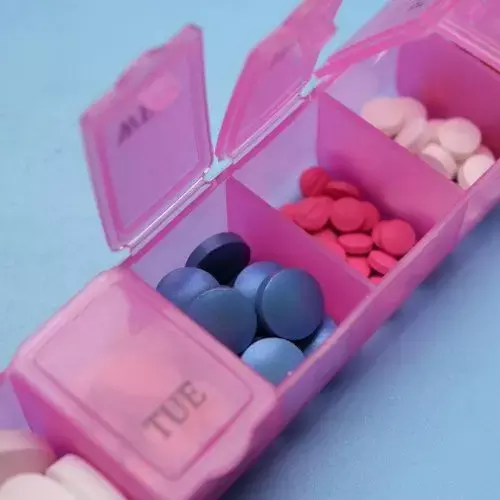- Home
- Medical news & Guidelines
- Anesthesiology
- Cardiology and CTVS
- Critical Care
- Dentistry
- Dermatology
- Diabetes and Endocrinology
- ENT
- Gastroenterology
- Medicine
- Nephrology
- Neurology
- Obstretics-Gynaecology
- Oncology
- Ophthalmology
- Orthopaedics
- Pediatrics-Neonatology
- Psychiatry
- Pulmonology
- Radiology
- Surgery
- Urology
- Laboratory Medicine
- Diet
- Nursing
- Paramedical
- Physiotherapy
- Health news
- Fact Check
- Bone Health Fact Check
- Brain Health Fact Check
- Cancer Related Fact Check
- Child Care Fact Check
- Dental and oral health fact check
- Diabetes and metabolic health fact check
- Diet and Nutrition Fact Check
- Eye and ENT Care Fact Check
- Fitness fact check
- Gut health fact check
- Heart health fact check
- Kidney health fact check
- Medical education fact check
- Men's health fact check
- Respiratory fact check
- Skin and hair care fact check
- Vaccine and Immunization fact check
- Women's health fact check
- AYUSH
- State News
- Andaman and Nicobar Islands
- Andhra Pradesh
- Arunachal Pradesh
- Assam
- Bihar
- Chandigarh
- Chattisgarh
- Dadra and Nagar Haveli
- Daman and Diu
- Delhi
- Goa
- Gujarat
- Haryana
- Himachal Pradesh
- Jammu & Kashmir
- Jharkhand
- Karnataka
- Kerala
- Ladakh
- Lakshadweep
- Madhya Pradesh
- Maharashtra
- Manipur
- Meghalaya
- Mizoram
- Nagaland
- Odisha
- Puducherry
- Punjab
- Rajasthan
- Sikkim
- Tamil Nadu
- Telangana
- Tripura
- Uttar Pradesh
- Uttrakhand
- West Bengal
- Medical Education
- Industry
Alternate day oral iron more effective than daily use among diabetes patients with anemia, suggests study

Alternate-day oral iron is more effective than daily use among diabetes patients with anaemia suggests a new study published in the Annals of Medicine and Surgery.
Iron deficiency anaemia (IDA) and diabetes mellitus (DM) are the most prevalent diseases, and diabetic patients are more prone to IDA. Therefore, the main aim of this study was to investigate the relationship between patients with diabetes and IDA about taking iron pills daily and every other day to reduce the effects related to it. Ninety-one participants were enrolled and randomly divided into two groups, with a final analysis cohort of 72 patients. The primary focus was on changes in serum Hb and Ferritin levels. The screening phase lasted 24 weeks, leading to 72 eligible participants meeting the criteria for entry into the study. Additionally, the study examined alternations in Hb and Hb A1C levels after treating patients with iron deficiency.
The Hb and ferritin level contrasts between groups were not significant (P = 0.096 and P = 0.500, respectively). The relationship between Hb A1C and Hb levels before and after treatment was positive and significant (r 2 = 0.187). The results of the present study show that although the effectiveness of using oral iron supplements did not have a significant difference in terms of increasing haemoglobin and ferritin, the use of oral iron once every other day was more effective than the use of oral iron every day, and also in this study Like other studies, this result concluded that there is a negative correlation between Hb A1C and Hb, and to check the status of Hb A1C in diabetics, the level of Hb should be considered first.
Reference:
Taati B, Ganji R, Moradi L, Vosoughi T, Gisouei A. Therapeutic effect of ferrous sulfate in diabetic patients with iron deficiency anaemia: a randomised controlled trial. Ann Med Surg (Lond). 2024;86(4):1989-1996. Published 2024 Feb 15. doi:10.1097/MS9.0000000000001838
Dr. Shravani Dali has completed her BDS from Pravara institute of medical sciences, loni. Following which she extensively worked in the healthcare sector for 2+ years. She has been actively involved in writing blogs in field of health and wellness. Currently she is pursuing her Masters of public health-health administration from Tata institute of social sciences. She can be contacted at editorial@medicaldialogues.in.
Dr Kamal Kant Kohli-MBBS, DTCD- a chest specialist with more than 30 years of practice and a flair for writing clinical articles, Dr Kamal Kant Kohli joined Medical Dialogues as a Chief Editor of Medical News. Besides writing articles, as an editor, he proofreads and verifies all the medical content published on Medical Dialogues including those coming from journals, studies,medical conferences,guidelines etc. Email: drkohli@medicaldialogues.in. Contact no. 011-43720751


